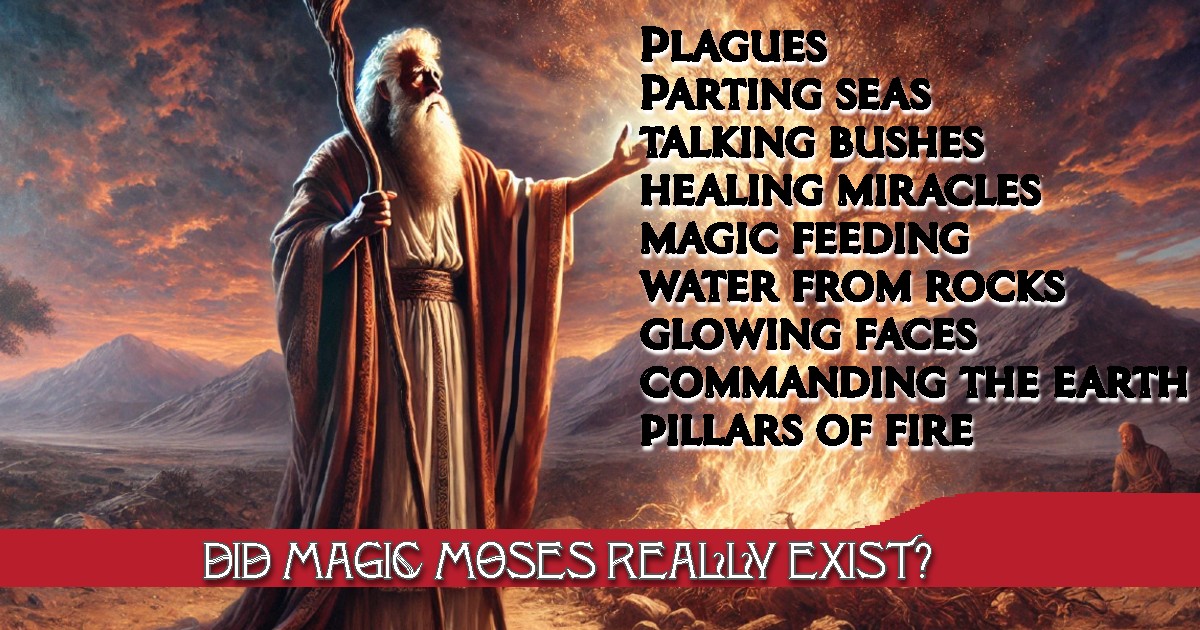What if one of the most iconic figures in religious history never existed? Brace yourself: the story of Moses may be more myth than history. While billions revere Moses as the lawgiver who led the Israelites out of Egypt and received the Ten Commandments, secular scholars are uncovering evidence that challenges his very existence. Here’s what the Moses Myth Theory reveals.
The Deafening Silence of Archaeology
Despite extensive archaeological digs in Egypt and the Sinai Peninsula, no concrete evidence has been found to support the Exodus story—no traces of a massive migration, no artifacts, no ancient campsites, and crucially, no mention of Moses in Egyptian records. Considering the detailed nature of Egyptian chronicles, this absence is glaring. The Egyptians meticulously recorded even minor events, yet there’s silence on plagues, mass slave escapes, or a figure like Moses.
The Exodus: A National Myth?
Scholars like Israel Finkelstein and Neil Asher Silberman argue that the Exodus narrative serves as a founding myth rather than historical fact. In “The Bible Unearthed,” they suggest that the story was crafted centuries after the supposed events, designed to unite disparate tribes under a shared history. The tale mirrors other ancient origin myths, serving to forge identity and inspire religious cohesion.
Moses: A Name with Egyptian Roots
Strikingly, the name “Moses” (or Moshe in Hebrew) is of Egyptian origin, meaning “son” or “born of,” as in names like Thutmose or Ramesses. This linguistic link raises questions: Why would a Hebrew leader carry an Egyptian name? Some theorists propose that Moses was a literary invention, possibly inspired by Egyptian figures or even political reforms like those of Akhenaten, the monotheistic pharaoh discussed in Jan Assmann’s “Moses the Egyptian.”
Ancient Myths That Mirror Moses’ Story
Moses’ birth narrative—placed in a basket and set adrift on a river—is eerily similar to the tale of Sargon of Akkad, an ancient Mesopotamian ruler whose story predates the biblical account by over a thousand years. Both narratives involve an infant rescued from water, rising to greatness. Are these parallels mere coincidence, or is Moses’ story a retelling of older myths?
Biblical Inconsistencies and Anachronisms
The Documentary Hypothesis, championed by scholars like Thomas L. Thompson, reveals that the Torah (the first five books of the Bible) is a patchwork of texts from different authors and time periods. Contradictions abound: different versions of the same events, varying laws, and conflicting genealogies. Some details reflect historical contexts from centuries after Moses would have lived, suggesting these texts were written long after the events they describe.
Rethinking an Icon
The absence of archaeological evidence, the mythological parallels, and the textual inconsistencies paint a startling picture: Moses may not have been a historical figure at all. Instead, he could be a mythological construct, a symbol of leadership and law, crafted to give ancient Israel a heroic origin story.
Sources:
- The Bible Unearthed: Archaeology’s New Vision of Ancient Israel and the Origin of Its Sacred Texts by Israel Finkelstein & Neil Asher Silberman
- The Mythic Past: Biblical Archaeology and the Myth of Israel by Thomas L. Thompson
- Moses the Egyptian: The Memory of Egypt in Western Monotheism by Jan Assmann
- On the Reliability of the Old Testament by Kenneth A. Kitchen
- The Invention of the Jewish People by Shlomo Sand
- Who Wrote the Bible? by Richard Elliott Friedman
- The Origins of Biblical Monotheism: Israel’s Polytheistic Background and the Ugaritic Texts by Mark S. Smith
- The Hebrew Bible (Torah) and comparative studies with Ancient Near Eastern texts, including the Epic of Gilgamesh and the Legend of Sargon of Akkad
- Archaeological reports from excavations in Egypt, Sinai, and Canaan
- Egyptian historical records and inscriptions from the New Kingdom period
What Do You Think?
If Moses never existed, what does that mean for the foundations of faith? Let us know your thoughts. 🤔 #BiblicalHistory #MosesMyth #QuestionEverything

